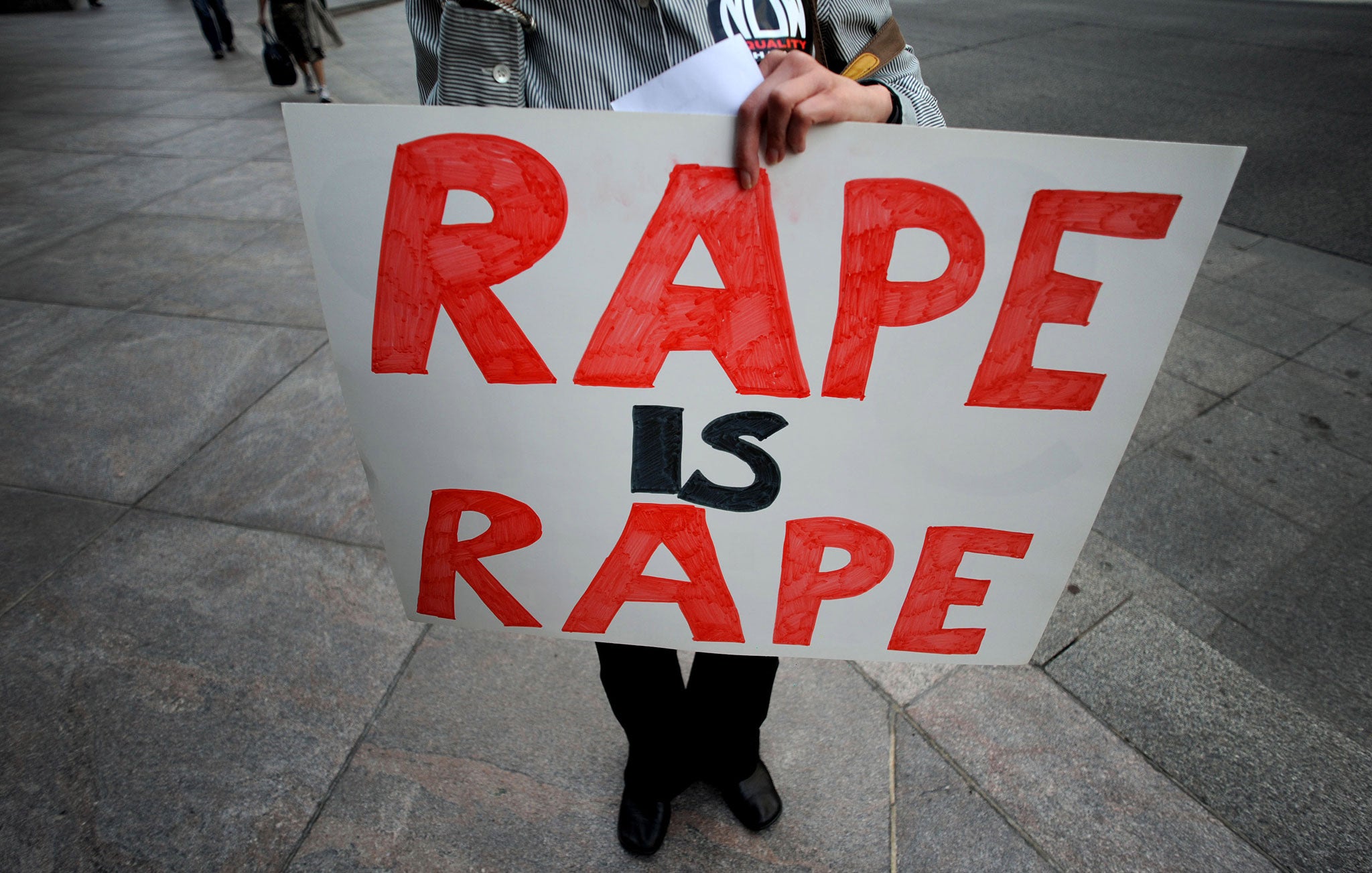Anonymity for the accused: Rape is different to other crimes, and we need to talk about why
If there are other victims out there, naming of the accused can encourage them to speak out. But if the accused is rich and powerful, their identity can act as a shield

Your support helps us to tell the story
From reproductive rights to climate change to Big Tech, The Independent is on the ground when the story is developing. Whether it's investigating the financials of Elon Musk's pro-Trump PAC or producing our latest documentary, 'The A Word', which shines a light on the American women fighting for reproductive rights, we know how important it is to parse out the facts from the messaging.
At such a critical moment in US history, we need reporters on the ground. Your donation allows us to keep sending journalists to speak to both sides of the story.
The Independent is trusted by Americans across the entire political spectrum. And unlike many other quality news outlets, we choose not to lock Americans out of our reporting and analysis with paywalls. We believe quality journalism should be available to everyone, paid for by those who can afford it.
Your support makes all the difference.Should rape be treated differently from every other crime? This is what we’re asking when we ask about anonymity for accused rapists, which is what is being discussed, once again, this week, after the subject was addressed by the chairwoman of the bar council, Maura McGowan QC.
Rape is treated differently to other crimes already, to some extent, by the fact that the accuser is given anonymity. But that’s not the only thing that makes it a bit different. For one thing, rape is (usually) very difficult to prove because there are (usually) no witnesses, and because proving that the actual act happened doesn’t automatically prove it wasn’t consensual. That isn’t the case if someone stabs you or shoots you. So rape cases are different from a lot of other violent crimes in that they come down to one word against another.
Another crucial difference is the number of widely-held misunderstandings about what actually constitutes a rape in the first place.
High profile politicians, like George Galloway, and columnists, like Brendan O’Neil, split hairs in the discussion of rape. Some say there should be ‘degrees of rape,’ like we have ‘degrees of murder,’ as if rape can be like manslaughter or self-defence; as if a rapist might rape as a result of provocation, or even out of helplessness.
False accusations
These ‘debates’ about whether rape is rape matter. It’s disturbing how many survivors, despite the trauma, flashbacks, nightmares, the physical injuries, still question, guiltily, whether their experience really ‘counts’ as rape. And in the same way, some rapists do not realise they are rapists. And no, that’s not an excuse: you have no excuse for not knowing that you’re not allowed to stab people, so you have no excuse for not knowing that you’re not allowed to put your penis (or anything) inside someone without their consent.
And we can’t leave gender out of this. Men are raped too but it’s impossible to separate the hysteria about false accusations from a deep-rooted sexual suspicion of women. Male rape is treated worse in lots of ways but the myths about false accusations are usually gender specific. What if your ex is bitter and wants revenge (women are crazy)? What if she wants your money (women are gold-diggers?) What if she seduces you and then cries rape (because you can’t entirely expect men to control where they choose to put their penis)?
Rape shouldn’t be different from other crimes, but it is; it’s just not different for the sexist reasons that get thrown around so often. (Reading Carol Sarler you’d think making a rape accusation is one big barrel of chuckles.)
Interestingly, the worst examples of high profile “smearing” or false accusations wrecking lives is the result of a grossly irresponsible, male-dominated, profit-driven media. Chris Jeffries? Lord McAlpine? Who talked up those stories?
Bias
All of this means that the way a rape case is portrayed in the media, and how it is interpreted in courts, often comes down to a subjective character judgment, about both the alleged victim and the alleged perpetrator, in a way that doesn’t happen so much with other crimes. That’s why anonymity for the victim is essential. As soon as an accused rapist is named, especially if they’re well-known, the victim is likely subject to a hate campaign, including a public naming and character assassination, even when they have anonymity.
This is extremely unhelpful. If there are other victims out there, the naming of the accused can encourage them to speak up. But if the accused is powerful, popular, has access to money, or friends in the media, their identity can act as a shield. How many times have we heard people say about an accused rapist: “But he seems so nice” before finding that he’s guilty? Or, of course, the inverse: “He seems so creepy and weird,” before finding that he’s innocent?
Some people will go to any lengths to avoid the reality that there’s no sure-fire way of knowing what a rapist looks like. The unfortunate truth is, they look the same as everybody else, until they’re raping you. Anonymity is a complicated legal area but until we get to grips with the mythical notion of what a rapist is and what a rapist isn’t, society’s judgment of rapists will always end up being as much about subjective character judgments than about who did what to whom without consent. And that is why whether you have anonymity for the accused or not, rape is already different to other crimes. What we really need to do is try to shape a world in which it isn’t.
Join our commenting forum
Join thought-provoking conversations, follow other Independent readers and see their replies
Comments